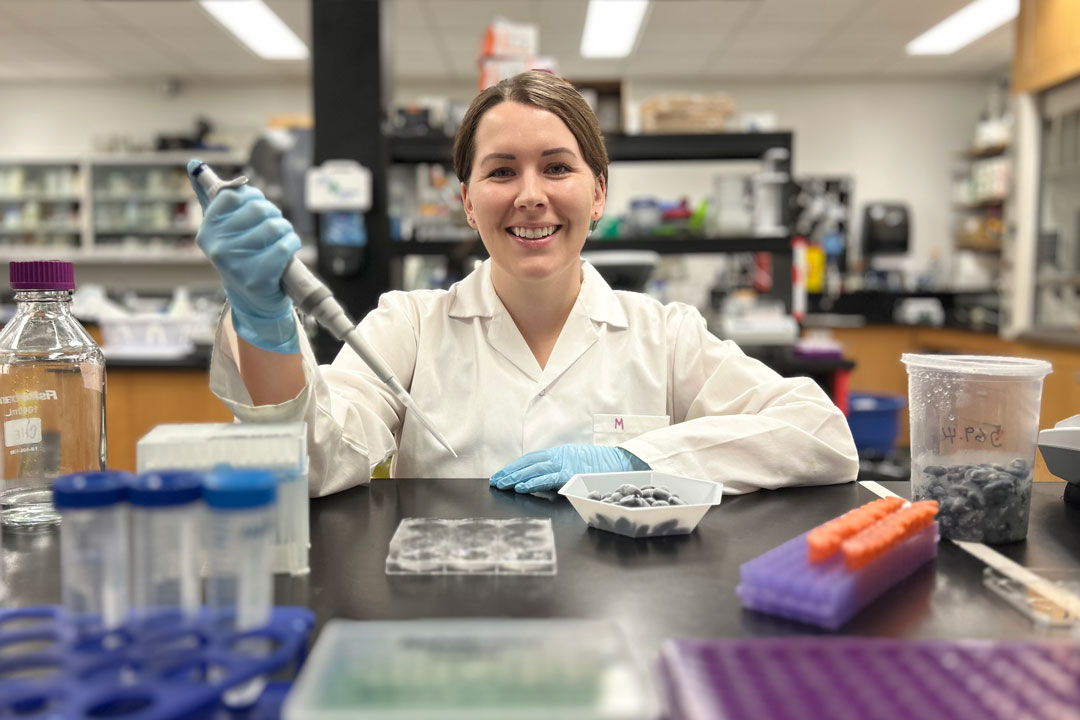
Tackling the science of aging well
USask PhD student and Vanier Scholar Morgan Fleming is exploring how a component of plant-based foods might help you live longer.
By Jane CaulfieldMaintaining a balanced, healthy diet is one way to delay and manage age-related diseases, such as some cancers as well as cardiovascular and neurodegenerative diseases. But knowing exactly what kinds of foods to eat and, more importantly, how those foods can target specific issues at the cellular level, will help our overall ability to manage the challenges of aging.
“It seems like at least on a yearly basis we hear about friends or family being diagnosed with age-related diseases, and my work can contribute to a body of knowledge that can delay that for everyone,” said Fleming, a graduate student in USask’s College of Agriculture and Bioresources. Fleming is researching phenolic compounds – a well-known component of plant-based foods that can help people live longer, healthier lives.
Known to support heart health, decrease the negative impacts of diabetes, and have anti-inflammatory properties, there are more than 10,000 structurally different phenolic compounds identified in nature to date. Previous research has postulated that different phenolic compounds can work together synergistically to further promote human health, but exactly how they do that is not well understood. That’s where Fleming’s research journey begins.
“We know that phenolic compounds are good for us. They are antioxidants, which means that they help protect us from damaging molecules,” she said. “We have an opportunity to learn more about how phenolic compounds can do more for humans in regard to impacts on cellular processes and regulating health and disease.”
Working under the supervision of professor emeritus Dr. Nicholas Low (PhD) and Dr. Christopher Eskiw (PhD) in the Department of Food and Bioproduct Sciences, Fleming is cultivating human skin cell samples and treating them with specific combinations of phenolic compounds derived from Haskap berries – bred and grown at USask – to analyse their potential benefit.
“I am really enjoying the process of being a PhD student,” she said. “There is an abundance of resources that the college provides to ensure success. Not only with academic support but also with our mental health, finding balance between work and life, building community and much more.”
Providing opportunities for future scientists
The 2024/25 academic year will be the second year in a row that Fleming has won the Natural Sciences and Engineering Research Council of Canada (NSERC) Indigenous Student Ambassador grant, which aims to promote interest and participation in the natural sciences and engineering within Indigenous communities and schools across Canada.
As a Métis citizen, Fleming said that being an Indigenous Student Ambassador is about finding ways to inspire Indigenous youth to think about a future career in science, technology, engineering and math (STEM) disciplines.
“I think it’s really important to show young students what options are available to them in the sciences,” Fleming said. “Food science is one of the lesser-known areas, but it’s so cool and so relevant to everyone’s everyday life.”
Last year, in consultation with her lab mates and her supervisors, Fleming developed a day full of hands-on activities and experiments for Grade 7 and 8 students from Chief Whitecap School in Saskatoon.
Throughout the day, students were able to learn about food science topics such as cross-contamination, the Maillard reaction, and vitamin C titration in the Agriculture Building in a food science undergraduate teaching laboratory.
“When I was in elementary and middle school, what really got me interested in the sciences were similar kinds of interactive activities, so that’s what I am trying to do with the kids I work with,” she said. “But when I started university and I learned more about the different kinds of careers available, I moved away from basic nutrition and immersed myself into the science of food.”
Fleming said she first applied for the grant, which provides recipients with $5,000 to help fund various outreach initiatives, when she learned that there was a lack of Indigenous students in the Department of Food and Bioproduct Sciences.
“In Canada, only about two per cent of people employed in STEM are Indigenous. I want to try and change those numbers,” she said.
A lifetime of learning ahead
Being a PhD student takes a lot of time and energy, much of which is fueled by coffee, Fleming confesses. But her dedication to her work is powered by more than that – she is driven by a desire to help improve the quality of life for as many people as possible. And it’s that kind of passion that helped her win the prestigious Vanier Scholarship.
“It’s very motivating to know that I have people believing in the research and outreach work I am doing,” she said. “This means I will have an opportunity to engage with more high-quality research because the funding is not as limited.”
Jointly administered by the Canadian Institutes of Health Research (CIHR), the Social Sciences and Humanities Research Council (SSHRC) and NSERC, the Vanier Scholarship provides recipients with $50,000 per year of doctoral-level study. It is awarded to a select few students across Canada who demonstrate academic excellence, research potential, and exceptional leadership in their chosen field of study.
Together, we will undertake the research the world needs. We invite you to join by supporting critical research at USask.
Article re-posted on .
View original article.

